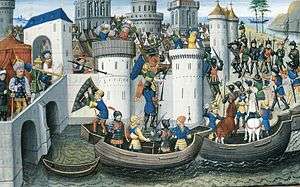Post Miserabile
Post miserabile (Latin: Sadly, after) was a papal bull issued by Pope Innocent III on 15 August 1198 calling for the Fourth Crusade in the Holy Land. More than any other crusading bull, it was not issued in response to any single event, such as setback in the East, but was more organisational in tone, foreshadowing the bureaucratic and administrative changes Innocent would make to the crusading institutions.

Background
Upon Innocent's accession to the papacy in 1198, the preaching of a Fourth Crusade became one of the goals of his pontificate.[1] Both the kings of England and France were at war, and several other states did not heed the pontiff's call to take up arms for a crusade.[1] Knowing that most European monarchs were preoccupied with their own affairs of state, the purpose of Post miserabile was to settle their disputes and focus attention on the East.[2]
One of the techniques used by Innocent to ensure action is to report alleged Muslim taunts against the kings of France and England:
Already we have weakened and shattered the spears of the French, we have crushed the efforts of the English [...] in fact, your kings and princes, whom we drove out of our lands of the East a little while ago, disguise their fear by acting boldly, returning to their hiding places, we will not say 'kingdoms,' they prefer to fight each other in turn than to experience once more our might and power.[note 1]
The bull also called for a revival of religious enthusiasm for a crusading throughout Europe.[2]
Outline of the bull
The bull begins by describing the present plight in the Holy Land, before going on to criticise Europe's rulers for their inability to act:
And while they persecute each other in turn with inexorable hatred, while one strives to avenge his injuries against the other, none is moved by the injury to the Crucified One. They are not paying attention to how our enemies persecute us.[note 2]
The bull then appoints Cardinals Sofferdo and Peter Capuano as special assistants in preaching and organising the crusade,[2] specifically encouraging them to target the kings of England and France to assist.[2]
Post miserabile also gives a great deal of organisational instructions how the crusade is to be run and established.[2] In an attempt to encourage a revival in crusading, the bull goes into some detail concurring the privileges and benefits that could be had from undertaking to go to the Holy Land[2] The bull was instrumental in establishing a basis for the crusade and due to the preaching of Fulk of Neuilly, a crusading army was finally organised at a tournament held at Écry-sur-Seineby by Count Thibaut of Champagne in 1199.[1]
Notes and references
Notes
- "Iam infirmavimus et confregimus astas Gallorum, Anglorum conatus elisimus [...] Reges enim et principes vestri, quos dudum de terra fugavimus Orientis, ut timorem suum audendo dissimulent, ad suas latebras, ne dicamus regna, reversi, malunt se invicem expugnare quam denuo vires nostras et potentiam experiri."[3]
- "[...] Et dum se invicem inexorabili odio persecuntur, dum unus in alium suas nititur iniurias vindicare, non est quem moveat iniuria Crucifixi, non attendentibus ipsis, quod iam insultant nobis inimici nostri..."[3]
References
- Runciman, Steven (1954). A History of the Crusades: The Kingdom of Acre and the Later Crusades (Volume 3). ISBN 014013705X.
- Madden, Thomas F. (19 August 2008). The Fourth Crusade: Event, Aftermath, and Perceptions: Papers from the Sixth Conference of the Society for the Study of the Crusades and the Latin East in Istanbul, Turkey. ISBN 0754663191.
- Innocent III. Register. p. 329.